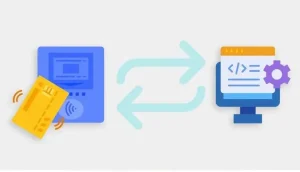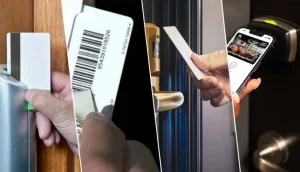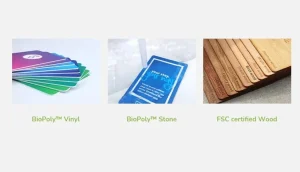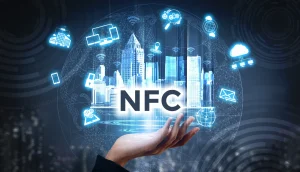Radio Frequency Identification (RFID) technology has been widely adopted in the hospitality industry. This technology offers a seamless, secure, and efficient solution that can transform how hotels interact with guests, manage access, and optimize daily operations. By incorporating RFID technology into hotel business cards, you not only enhance the modernization of your hotel but also provide guests with a brand-new smart service experience.
1. What is RFID Technology? How Is It Applied in Hotels?
RFID is a technology that transmits data through radio waves. It utilizes wireless communication between tags and readers to identify and track objects. Common applications of RFID technology in the hotel industry include keyless room access, inventory management, and payment processing. Integrating RFID technology into hotel business cards can significantly enhance security, reduce operational costs, and provide guests with a more convenient experience.
Working Principles of RFID in Hotel Business Cards
RFID hotel business cards are equipped with a small chip embedded in the card, which communicates wirelessly with RFID readers throughout the hotel. When a guest taps their RFID business card on a designated reader, information stored on the card (such as guest identity, access permissions, or payment information) is quickly transmitted to the system, enabling fast and reliable identity verification and transaction processing.

The main components of a hotel RFID system include:
- RFID Tags (Chips): Chips embedded in the business cards store key information.
- RFID Readers: Devices that read data from the cards and communicate with the hotel systems.
- Hotel Backend Systems: Responsible for receiving and processing data from the readers, managing guest room access, control permissions, and ensuring smooth and secure hotel operations.
This seamless interaction allows RFID technology to be applied in various scenarios within hotels, from room access to payment services.
2. Advantages of RFID Business Cards in Hotels
Integrating RFID technology into hotel business cards brings a multitude of benefits. From enhancing security to optimizing guest experiences, RFID technology can fundamentally transform hotel operations.
Enhancing Guest Convenience and Experience
Modern guests increasingly prioritize convenience and efficiency. RFID business cards allow them to access rooms and perform payment operations with simple tap actions, greatly enhancing their overall experience.
Room Access and Security: RFID business cards enable guests to access their rooms directly with the card, eliminating the need for traditional room keys. This reduces the risks associated with lost or stolen keys, thus enhancing security.
Faster Check-In/Check-Out: RFID business cards can simplify the check-in and check-out process. Guests merely need to hold their RFID business card near a reader to quickly complete identity verification, avoiding the cumbersome procedures of traditional front desk queues.
Cashless Payments: RFID business cards can also serve as payment tools, allowing guests to pay for dining, spa services, and room service directly with the card. This cashless payment option provides guests with a more convenient way to settle bills without needing cash or credit cards.
Improving Operational Efficiency
Incorporating RFID technology into hotel business cards not only enhances guest experiences but also improves internal operations, resulting in significant cost savings and efficiency gains.
Streamlined Access Control: In addition to room access, RFID technology can be used to control access to other restricted areas of the hotel, such as staff-only zones, gyms, or executive lounges. This ensures that only authorized personnel or guests can enter these areas.
Inventory and Asset Management: RFID technology can track hotel assets, such as towels, linens, and electronic devices, thereby reducing losses and theft. This tracking system can also integrate with the hotel’s property management system to achieve better inventory control.
Reduced Labor Costs: RFID-based automated systems reduce the need for manual checks and interventions, freeing up staff time to focus on more important tasks. With many hotels facing staff shortages, using RFID technology can help address this issue.

Strengthening Security
For any hotel, security is paramount, and RFID business cards can effectively enhance hotel security. Unlike traditional key cards, RFID business cards utilize encryption and unique identification codes to provide higher security levels.
Encrypted Data: RFID systems employ encrypted data, making it difficult for hackers to copy or clone RFID cards. Each card has a unique identification code that can only be read on the hotel’s secure network.
Traceable Access History: RFID technology also allows hotels to track guest access history, which is invaluable in the event of security incidents or emergencies. For example, if someone attempts unauthorized access to a room, the hotel can quickly review access logs and take appropriate action.
Mitigating Risks Associated with Lost Cards: Traditional hotel keys can lead to theft if lost, while RFID business cards, even if misplaced, can be quickly deactivated remotely at the front desk. Additionally, RFID cards are harder to replicate, further enhancing overall security.
3. Customizing RFID Business Cards for Hotel Brands
The design of hotel business cards is another aspect that managers prioritize. RFID hotel business cards can be customized according to the unique characteristics of the hotel brand. Whether it’s designing luxurious styles for a five-star hotel or creating minimalistic looks for boutique hotels, RFID cards can fully reflect the individuality of the establishment.
Design and Brand Customization
RFID business cards can be printed with the hotel’s logo, color schemes, and promotional information. This not only helps to reinforce the brand image but also provides guests with a modern and convenient service experience.

Personalized Functionality Design
By selecting the appropriate chip technology for RFID hotel business cards, hotels can tailor the cards to meet their operational needs and enhance guest experiences. Whether providing high-security MIFARE® DESFire® chips for luxury hotels or opting for cost-effective NTAG® chips for budget-friendly accommodations, RFID cards can optimize operations and elevate guest experiences based on specific hotel requirements.
At rfidltd.com, we offer over 50 chip options that can flexibly meet the needs of various hotels. By choosing the most suitable chip, hotels can not only facilitate convenient access control but also ensure a smoother and more personalized check-in experience for their guests.
4. The Future Prospects of RFID Technology in Hotels
With continuous technological advancements, the application of RFID in the hotel industry is set to become increasingly intelligent, responding to growing customer demands and enhancing hotel competitiveness. These changes include:
Integration with Other Technologies
In the future, RFID systems are likely to integrate with other technologies such as:
Internet of Things (IoT): Combining RFID with the IoT will allow smart devices within hotel rooms (such as lighting, air conditioning, and entertainment systems) to interact with RFID business cards, enabling guests to control in-room devices through their cards.

Mobile Device Integration: Guests may manage their RFID business cards through mobile applications, further enhancing convenience.
Embracing Sustainability Measures
Hotels are placing greater emphasis on sustainability, and RFID technology can support these goals. RFID cards are durable, reducing the need for frequent replacements, and can be manufactured from eco-friendly materials, thereby minimizing environmental impact. To understand popular eco-friendly materials for hotel cards, check out this detailed blog post.
Conclusion
Integrating RFID technology into hotel business cards offers numerous advantages, including enhanced security, increased operational efficiency, and improved guest experiences. By adopting RFID cards, hotels can streamline processes, boost customer satisfaction, and prepare for future technological developments. As technology continues to advance, RFID will undeniably play an increasingly critical role in the hotel industry, becoming one of the core technologies for future hotel operations.
Frequently Asked Questions
1. What are the main advantages of using RFID technology in hotel business cards?
RFID technology brings several benefits, including enhanced security, expedited check-in/check-out processes, cashless payment options, and improved operational efficiency.
2. Can RFID business cards be customized according to hotel branding?
Yes, RFID business cards can be fully customized to meet the hotel’s branding and design requirements, including logos, color schemes, and personalized information.
3. How does RFID enhance hotel security?
RFID business cards are more secure than traditional key cards because they utilize encrypted data, making them difficult to copy. Additionally, RFID systems can track access history, helping hotels manage security risks effectively.
4. Can RFID technology be integrated with other hotel management systems?
Yes, RFID can be integrated with hotel property management systems, inventory control systems, and payment systems to enhance overall operational efficiency.
5. How does RFID improve guest satisfaction?
RFID technology enhances guest convenience and personalization by simplifying the check-in process, providing cashless payment options, and enabling faster room access, significantly boosting overall guest satisfaction.

RFID Antenna UHF
15-Meter Cable for UHF RFID Fixed Reader
UHF Tag
4″x2″ 860-960MHz UHF RFID Label RFID M4D
UHF Tag
4″x4″UHF RFID Label Alien H3 | ISO18000-6C
RFID Antenna UHF
5-Meter Cable for UHF RFID Fixed Reader
HF Card
ABS RFID KEY-FOB Tag RFID Classic 1K
HF Card
ABS RFID KEY-FOB Tag RFID Classic 4K
HF Card
ABS RFID KEY-FOB Tag RFID Ultralight C
HF Tag
ABS RFID KEY-FOB Tag RFID Ultralight EV1
LF Card
ABS RFID KEY-FOB Tag ATA5577
LF Card
ABS RFID KEY-FOB Tag EM4200
HF Card
ABS RFID KEY-FOB Tag EM4305
HF Card
ABS RFID KEY-FOB Tag RFID TAG 213